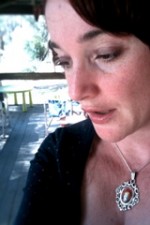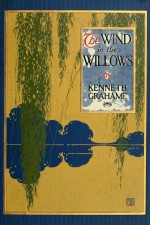Writers Write: My Favourite Book 8
Penni Russon
Today’s Guest Blogger is Penni Russon, one of this country’s most admired writers for young people, with works as varied as the lyrical ‘Undine’ trilogy and Girlfriend Fiction.
I have just excised a 300-word introduction listing all the books I won’t be talking about – for to choose one favourite is to neglect several cherished friends from childhood. However, the novel I am actually going to write about is The Wind in the Willows by Kenneth Graeme. As an adult I can raise all sorts of ideological issues with this book, probably the main one being the almost complete absence of female characters (apart from a laundress who furnishes a cross-dressing Toad with his getaway gear). This is a motherless world; it is a narrative of masculine encounters. These are English gentleman loafing about the countryside dressed up as toads and badgers and moles and water-rats and otters, with the lower classes lurking in the wild woods: weasels and rabbits and stoats.
It is strange then that this motherless world was one I discovered with my mother. When I was perhaps eight, Mum and I read this book together. We would read it in her bed in the evenings or during the day (Mum, prone to depression, often took herself off to bed during the day). Mum read mostly but I would take my turn too. Her bed was an island, the landscape was the big rumpling doona spread over us.
My favourite chapter was Dolce Domum, where Mole, journeying back to the river with his friend Rat, suddenly smells out his own forgotten, abandoned home. He sniffs it out urgently, Rat following, but when Mole finds it, he is bitterly disappointed, ashamed of its shabbiness. However, what Mole sees as a barren hole, Rat – ever the gentleman – gently recasts as cosy and welcoming. Carollers come to call and Rat sends one of them out with money and instructions to bring in Christmas victuals. The feeling of Christmas – peace on earth, goodwill to all men (no need to be non-gender specific here!) – permeates this chapter like the warm glow of light in Mole’s abandoned hole.
My mother’s favourite chapter was The Piper at the Gates of Dawn, a chapter I don’t think I really understood until I was grown. Rat and Mole looking for Otter’s lost son Portly (the implication is that he has probably drowned) have a sublime spiritual encounter with Pan, who then disappears from the grove. They blink, confused. Something has happened, but what? Already they are forgetting. In Pan’s place they discover a sleeping Portly. Later as the river rocks them, they try desperately to cling to the memory of the encounter but the music and the words leave them and all is truly forgotten.
I think now my favourite part – certainly the scene in the novel I remember best – is the scene where an old Sea-rat tries to lure Ratty to join him in a wandering life:
‘And you, you will come too, young brother; for the days pass, and never return, and the South still waits for you… You can easily overtake me on the road, for you are young, and I am ageing and go softly. I will linger, and look back; and at last I will surely see you coming, eager and light-hearted, with all the South in your face!’
Mole comes to Rat’s assistance here – he prescribes writing poetry as a cure for Rat’s restless melancholy longing ‘even if it’s only just the rhymes.’ Perhaps the mother is the poetic, semiotic river: ‘this sleek, sinuous full-bodied creature’ who runs, trickles, dances and chuckles through the novel, gleaming with light, making a home of her body.
Or perhaps the compensation for the missing mother in Graeme’s world was the body of my own mother, and the storyworld we inhabited, the world of Bed and Doona.
Penni’s most recent novel is ‘Only Ever Always’, 2011, Allen & Unwin. For more, visit Penni’s blog: www.eglantinescake.blogspot.com


Beautifully expressed, Penni. You’ve inspired me to read ‘Wind in the Willows’ again – forty years after I first read it. Thank you.
And thank you too, Michael. Your guest posts have been rewarding journeys into great memories. 🙂
My pleasure, Sheryl. I’m getting a real kick out of reading them, too – and they’re prompting me to revisit some forgotten childhood favourites.
Hi Michael,
A lot peoplehave this book on their top ten list. As a kid, I was a bit disappoined in Badger’s final solution to rid ToadHall of the dreaded Stoars and Weasels. I must have been a mini-marxist but I always thought that such a demonstrable dickhead as Toad could have shared a giant hall that he didn’t even need, since half the time he was off discovering new transports of delight. And from memory, Badgers actually, advises to ‘Bash’em and Smash’em’. In other words beat the shit out of the squatters. It’s not a terribly inventive plan, is it? Actually I swear i can remember Ratty or Mole actually saying that, but it might well have been my father extemporising as he read the stories to me at night. Toad gave him the shits too. He was a man of taste, my dad.
Hi Doug. I think you’re onto something here. WitW, naturally, reflects the times in which it was written, and that includes the Edwardian class system. The stoat/weasel proles versus the Ratty/Mole/Badger bourgeousie? Toad as empty-headed aristo? I think Graham supports the status quo rather than revolution, tho’. Interestingly, Graham worked at the Bank of England and – reading between the lines of official documents – he left after a nervous breakdown due to a clear case of workplace bullying by a superior.
I have nothing to add, I just wanted to say I enjoyed this so much.
Beautiful crafted, a story about a story. 🙂